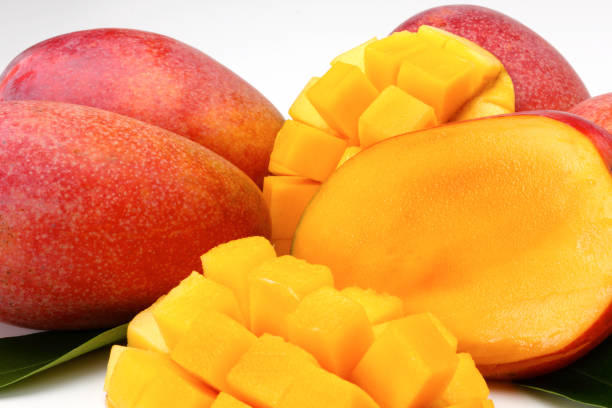The benefits of eating mangoes are quite numerous; it is a very delicious fruit with hundreds of varieties, and they all have exceptional nutritional profiles. The mango fruit is often called the “king of fruits” by most world cultures, and it is scientifically known as Manfifera indica L.
Mango is low in calories but still contains many nutrients, including vitamins A, C, and E, and carbohydrates. It has the potential to offer many health benefits, including eye and heart health support. So, in this article, you’ll discover the many amazing benefits of eating mango and why it deserves a place in your diet.
See also: Benefits of Fruits and Veggies – How These 15 Fruits and Veggies Can Benefit Your Health.
Nutritional Profile of the Mango Fruit
A cup of fresh mango juice contains a variety of essential nutrients, such as:
- Calories: 99 kcal.
- Fibre: 2.6 grams.
- Protein: 1.4 grams.
- Vitamin C: 67% of the daily value (DV).
- Fat: 0.6 grams.
- Carbs: 24.7 grams.
- Sugar: 22.5 grams.
- Folate: 18%
- Copper: 20%.
- Vitamin E: 10%.
- Vitamin B6: 12%.
- Riboflavin: 5%.
- Niacin: 7%.
- Vitamin K: 6%.
- Vitamin A: 10%.
- Potassium: 6%.
- Thiamine: 4%.
- Magnesium: 4%.
See also: 7 Healthy Foods That Are High In Vitamin D
Benefits of Eating Mango

Increases Digestive Process
One of the most significant mango benefits is that it assists in digestion. Mangoes contain enzymes that facilitate the decomposition and digestion of protein, and they also have a lot of fibre, which constitutes the bulk of your faeces and helps the digestive tract work efficiently. In addition, unripe mangoes contain a particular type of fibre called “pectin fibre,” which may lower the risk of type 2 diabetes and heart disease.
Boost Your Immune System
Mangoes are rich in vitamins A and C, which are essential for a healthy immune system and the creation of antibodies that fight against diseases. Studies indicate that less vitamin A in the body poses a significant risk of infections in an individual. Thus, it is essential to consume mango fruits or juice frequently to boost your body’s immunity.
Enhances Gut Health
Mango also contains a lot of prebiotic dietary fibre, which supports the growth of beneficial bacteria in the digestive system. A healthy gut is essential for general health and well-being, as it influences everything from metabolism to digestion.
May Support Heart Health
Mango contains fibre, magnesium, potassium, and vitamins that reduce the risk of heart disease. These nutrients facilitate the relaxation of blood vessels, which lowers blood pressure. Studies also indicate that the most remarkable dietary modification you can do to lower your risk of cardiovascular disease is consuming more potassium and less salt.
Additionally, mango doesn’t add cholesterol to your body. Instead, it’s capable of decreasing the cholesterol in your blood vessels and releasing fatty acids in your body.
Improves Skin Health
Mangoes are high in vitamins and antioxidants, which protect your skin against infections and aid in the fight against skin ageing. Every part of the mango fruit (i.e. flesh, peel, and seed) contains several forms of antioxidants in concentrated quantities. This means you should consume every part of the mango fruit to get all its benefits in full.

Additionally, mangoes have collagen in them. Collagen is a protein that provides your skin with flexibility and vitality. So, when you eat mangoes, you set yourself up for a healthier and glowing skin.
Reduce Cancer Risk
Mango is rich in polyphenols, which have antioxidant and anti-inflammatory properties. This compound has therapeutic and preventive effects for cancer. Studies have shown that a high presence of polyphenols can protect you against oxidative stress and reduce your risk of several types of cancers.
May Lower Your Risk of Diabetes
Compared to other fresh fruits, fresh mango has a high sugar content, and because of this, some people always think it may pose a risk to diabetics. There appears to be no research indicating that mango is a bad fruit for people with diabetes. However, several studies show that eating fresh fruits like mango can reduce one’s risk of developing diabetes.

Enhances Your Sexual Life
Mango contains a sufficient amount of beta-carotene as well as vitamin E, which impacts an individual’s sex drive. They can significantly improve men’s sperm health and increase libido in both men and women. Furthermore, eating mango can help a man prevent oxidative damage to his sperm cells.
See also: 30 Healthy Snacks Recommended By A Dietitian
Mango can provide numerous health benefits and add tropical flavour to your meals, and the best part is that there are different types of mangoes you can enjoy according to their seasons. However, if you have any medical condition or dietary restrictions, remember to consult your healthcare provider before making any major alterations to your diet.



